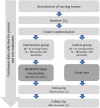Evaluation of a multi-component, non-pharmacological intervention to prevent and reduce sleep disturbances in people with dementia living in nursing homes (MoNoPol-sleep): study protocol for a cluster-randomized exploratory trial
- PMID: 33430785
- PMCID: PMC7802225
- DOI: 10.1186/s12877-020-01997-8
Evaluation of a multi-component, non-pharmacological intervention to prevent and reduce sleep disturbances in people with dementia living in nursing homes (MoNoPol-sleep): study protocol for a cluster-randomized exploratory trial
Abstract
Background: Sleep problems are highly prevalent in people with dementia. Nevertheless, there is no "gold standard" intervention to prevent or reduce sleep problems in people with dementia. Existing interventions are characterized by a pronounced heterogeneity as well as insufficient knowledge about the possibilities and challenges of implementation. The aim of this study is to pilot and evaluate the effectiveness of a newly developed complex intervention to prevent and reduce sleep problems in people with dementia living in nursing homes.
Methods: This study is a parallel group cluster-randomized controlled trial. The intervention consists of six components: (1) the assessment of established sleep-promoting interventions and an appropriate environment in the participating nursing homes, (2) the implementation of two "sleep nurses" as change agents per nursing home, (3) a basic education course for nursing staff: "Sleep problems in dementia", (4) an advanced education course for nursing staff: "Tailored problem-solving" (two workshops), (5) workshops: "Development of an institutional sleep-promoting concept" (two workshops with nursing management and sleep nurses) and (6) written information and education material (e.g. brochure and "One Minute Wonder" poster). The intervention will be performed over a period of 16 weeks and compared with usual care in the control group. Overall, 24 nursing homes in North, East and West Germany will be included and randomized in a 1:1 ratio. The primary outcome is the prevalence of sleep problems in people with dementia living in nursing homes. Secondary outcomes are quality of life, quality of sleep, daytime sleepiness and agitated behavior of people with dementia, as well as safety parameters like psychotropic medication, falls and physical restraints. The outcomes will be assessed using a mix of instruments based on self- and proxy-rating. A cost analysis and a process evaluation will be performed in conjunction with the study.
Conclusions: It is expected that the intervention will reduce the prevalence of sleep problems in people with dementia, thus not only improving the quality of life for people with dementia, but also relieving the burden on nursing staff caused by sleep problems.
Trial registration: Current controlled trials: ISRCTN36015309 . Date of registration: 06/11/2020.
Keywords: Cluster-randomized controlled trial; Complex intervention; Dementia; Nursing; Nursing home; Sleep disturbances.
Conflict of interest statement
All of the authors declare that they have no competing interests. Martin Nikolaus Dichter is a member of the BMC Geriatrics editorial board, but was not involved in the review process.
Figures
References
-
- RKI . Gesundheit in Deutschland. Gesundheitsberichterstattung des Bundes. Gemeinsam getragen von RKI und Destatis. Berlin: Robert-Koch-Institut; 2015.
Publication types
MeSH terms
Grants and funding
LinkOut - more resources
Full Text Sources
Other Literature Sources
Medical



